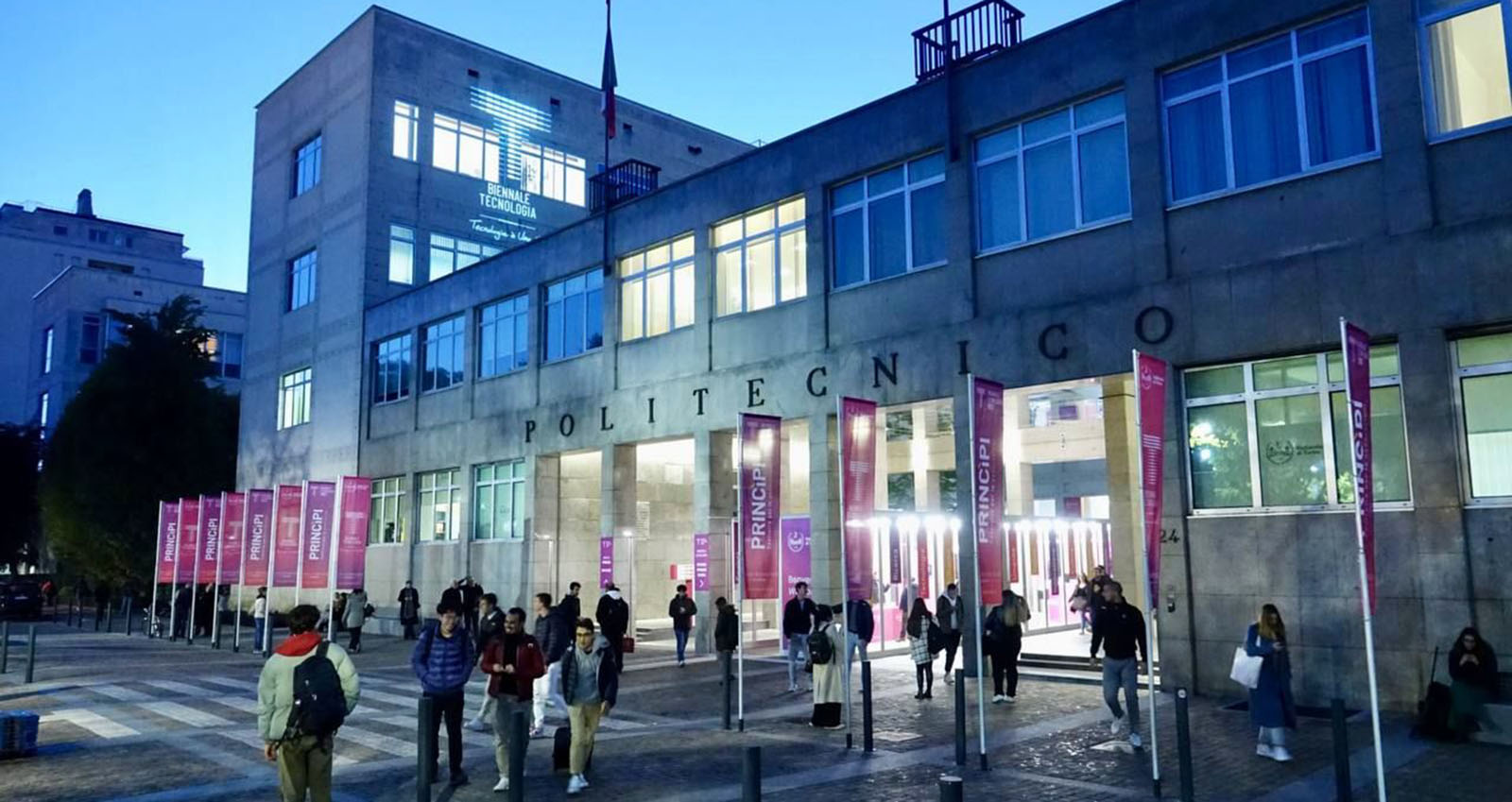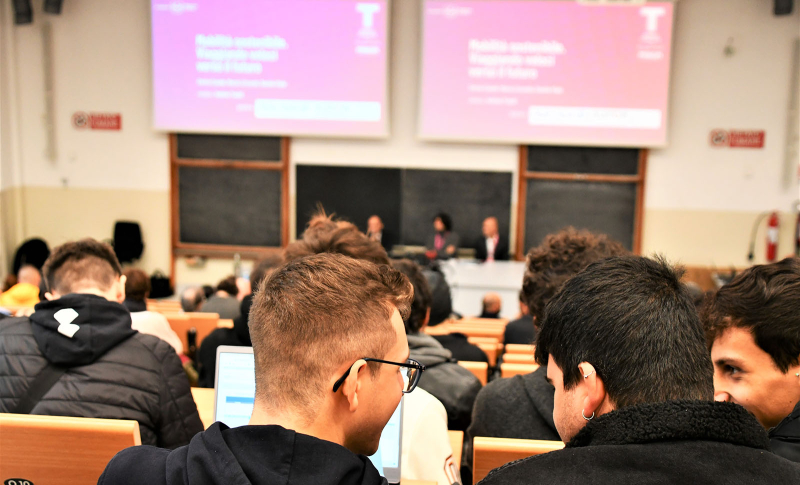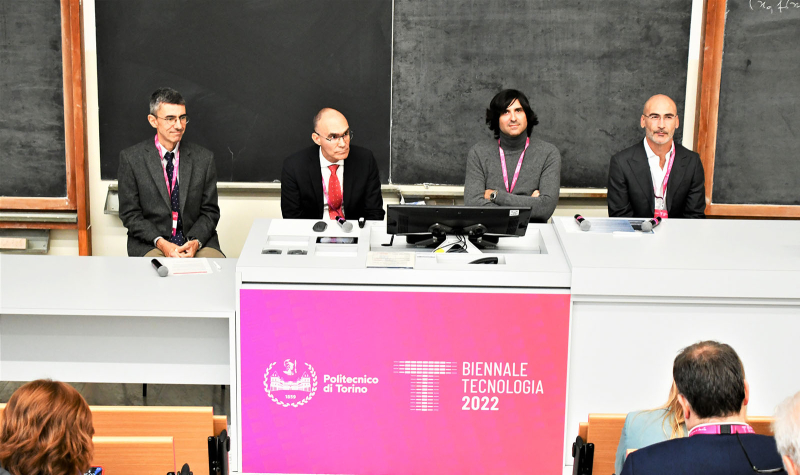Future
Biennale Tecnologia is back
More than 130 meetings for the event dedicated to science and technology organized by the Politecnico di Torino, which Avio Aero took part in once again.
Nov 2022
After the 2020 edition, which was held entirely online due to the Covid-19 pandemic, this year saw the in-person return of Biennale Tecnologia: the Politecnico di Torino event that proposes an open reflection on the subject of technological development and innovation. From November 10-13, more than 130 events, including lectures, talks, meetings, debates, shows and exhibitions, took place in iconic venues across the city and main campuses of the university.
The fil rouge of the 2022 edition of the Biennale Tecnologia was "Principles”, understood as new beginnings and the foundations on which to build the future. An increasingly complex and uncertain future, “threatened” by climate change, the pandemic and the conflict in Ukraine. A future that is still to be written and belongs to the young, to whom in fact Biennale Tecnologia provides an opportunity for a complex and structured reflection to conceive new ideas aimed at creating a better, more just and democratic world.
"Without the awareness of ordinary people, in a democratic country like ours it is unthinkable to undertake the change that is inevitable and respond to it in a way that is more resilient and antifragile." With these words, Rector of the Politecnico di Torino Guido Saracco opened the 2022 edition, recalling how , "together with Biennale Democrazia and the Festival of Economics, means that Turin can be considered one of the capitals of critical thinking. A city that sees its university population continue to grow in sharp contrast to the rest of Italy".
"For the Politecnico di Torino, Biennale Tecnologia represents an opening to society because it is impossible to do research and development on innovative technologies inside a vacuum. I was told some time ago that ‘universities today must teach students to invent the work they will do’. I think that is a wonderful definition and it reflects the idea of Politecnico 5.0, which we have tried to define in recent years with a multidisciplinary approach to the subject," the rector concluded.
"Covid, Risk and Decisions”: this was the title of the keynote address given by Nassim Nicholas Taleb, in which the professor, mathematician, philosopher, and author of the best seller "The Black Swan” addressed all the issues that arose through the management and understanding of the Covid-19 pandemic. Starting from the assumption that "no, the coronavirus pandemic is not a black swan because it was predictable that greater interconnection between people from every part of the globe would lead to an outbreak."
"We live in a society that tends to be self-destructing because it is increasingly risk-averse, but nevertheless I am optimistic because what we have learned is that we need to confront and assess what seems unforeseeable by predicting what the impact might be," Taleb concluded.
And there is one sector that has put in place actions aimed at addressing environmental issues for a number of years now: air transport. The various corporate, national and European initiatives devoted to the decarbonization of aviation are, in fact, responding to the need to reduce the climate impact of flying by also generating investments which are having spillover effects in other sectors as well. Speaking about this was Enrico Casale, New Technology Introduction Portfolio Manager at Avio Aero, as part of the panel "Sustainable Mobility. Traveling Fast into the Future”, on which Marco Liccardo, Chief Technology & Digital Officer of Iveco, and Davide Viale, General Manager Rolling Stock of Alstom Italy, also participated.
"In the field of aeronautics, it is not easy to talk about short time frames for the introduction of new products, because on average it takes about ten years from the moment the idea is first conceived to its entry into service," Casale said. "The complexity of actively working toward the decarbonization of the industry is a challenge we haven't experienced before, because it forces us to find short-term solutions as well as changing the way we approach technology development".
The main question is how to reduce air transport’s impact on the environment, and "one answer is the massive introduction of SAF (sustainable aviation fuels) which, although rapidly implemented, have the major problem of uncompetitive costs and poor production. At Avio Aero, we are trying to accelerate the pace towards a change in the engine architecture itself with open fan or hybrid electrical solutions".
"Education plays a key role, as does the seamless dialog between the academic world and industry in order to build training courses that adhere to current challenges, thereby prepared students capable of making an immediate contribution to companies"
According to Casale, the real change in pace will come "from the introduction of hydrogen as aviation fuel, because this has no climate impact when used as a propellant. The complexity, however, is related to safety and several technological challenges, including enabling the use of engines powered by liquid hydrogen, or employing it as a source of energy for fuel cells."
As a part of this, explained Casale, education “plays a key role, as does the seamless dialog between the academic world and industry in order to build training courses that adhere to current challenges, thereby prepared students capable of making an immediate contribution to companies."
A relationship with the academic world is crucial for Avio Aero, so much so that the Turin Additive Lab (TAL)" was established in conjunction with the Politecnico di Torino as “an example of the opportunity to facilitate the transition from university to the world of work." One of the cornerstones on which Biennale Tecnologia is also founded.







